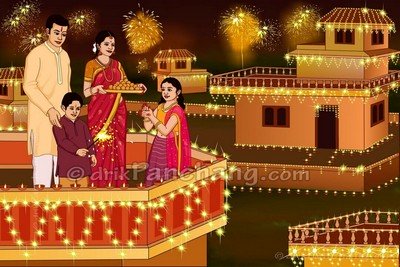





Diwali is the most significant religious festival among Hindus. Diwali, which is also known as Deepavali, is also known as the festival of lights. The festival spiritually signifies the victory of light over darkness, knowledge over ignorance, good over evil and hope over despair. At most places Diwali is celebrated for five days.

Diwali is historically a Hindu religion festival having its origin in the Era of Lord Rama or probably even before that at the time of churning of milky ocean when Goddess Lakshmi came out as the boon to the Gods and whole humanity.
Hinduism, being the oldest religion whose history goes back to thousands of years, it is not surprising that numerous legends are associated with Diwali. However all of them signify the victory of light over darkness, knowledge over ignorance, good over evil and hope over despair.
Various deities are worshipped and appeased during five days Diwali festivity. However Goddess Lakshmi, Lord Ganesha, Lord Kuber are the most prominent names which come to the mind when Diwali Puja is mentioned.
Lord Yamraj, God Dhanvantari, God Hanuman, Goddess Kali, Goddess Saraswati, Lord Krishna and Demon King Bali are other prominent deities who are worshipped during Diwali.
As per Amanta Hindu Calendar, five days Diwali festivity spans over two months.
Diwali begins - Krishna Paksha Trayodashi (28th day) of Ashwin (7th month)
Diwali ends - Shukla Paksha Dwitiya (2nd day) of Kartik (8th month)
As per Purnimanta Calendar
Diwali begins - Krishna Paksha Trayodashi (13th day) of Kartik (8th month)
Diwali ends - Shukla Paksha Dwitiya (17th day) of Kartik (8th month)
Diwali is celebrated as per luni-solar based Hindu calendar, its date(s) varies on Gregorian calendar and usually falls in mid-October and mid-November. Diwali Calendar lists all five days of Diwali festivities for 1000 years.
The third day of Lakshmi Puja is the most important day of five days festivities and most of the times this day is referred as Diwali Puja itself. Apart from above five festivals, the most famous festivals for which Diwali is known, Diwali Calendar lists several other festivals which are celebrated during 5 days Diwali festivities.
Numerous rituals are followed during Diwali. These rituals vary from state to state and within a state region to region. However,
Diwali celebrations are more extravagant in north Indian states. In South India like Holi, Diwali is a not as spectacular as that of North India. If one wants to enjoy spectacular fire-work at night then Delhi, Hyderabad and Mumbai are the most suitable metros to be in during Diwali.
Diwali celebrations are moderate in Chennai and Kolkata. In Chennai, Tamil Nadu, Narak Chaturdashi is more significant than Lakshmi Puja and in Kolkata, West Bengal, devotees worship Goddess Kali rather than Goddess Lakshmi on the third day of Diwali.
Most of the public places function as normal during Diwali. On the eve of Diwali most restaurants, pubs, metro trains, buses, taxies, cinema halls and shops, emergency and critical services at hospitals function as normal. However, at most commercial places more than half of the staff would be on leave.
As most businessmen perform Chopda Puja and Lakshmi Puja on the day of Diwali, most shops and private offices are open due to this reason. Stock Exchanges in India, although being closed due to Diwali holiday, are opened only for an hour for Muhurat trading in the evening. Muhurat trading is a symbolic ritual which is considered auspicious among traders and getting performed for years now.
For most big and small businesses Diwali, like Christmas in western countries, is the peak season when maximum sales are record. Many Bollywood blockbusters are planned and released during Diwali.
However Diwali, being marked as Gazette Holidays, all government offices and closed. Most schools and colleges are closed during Diwali.
In recently years, in most metros, time limit has been imposed for displaying and bursting the firework to curtail the noise pollution and for those who want to sleep peacefully on the night of Diwali. At most places either 10 p.m. or 11 p.m. time limit is imposed for bursting the firework.
Diwali is historically a Hindu religion festival having its origin in the Era of Lord Rama or probably even before that. However, Diwali is also celebrated in Sikhism and Jainism but for separate reasons. Sikh celebrates Diwali as Bandi Chhor Divas and Jain celebrates it as a day to commemorate Mahavir.